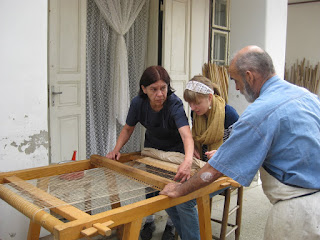Sziasztok (“hello everybody”)! As you can tell, my Hungarian vocabulary has expanded (albeit only a bit) since I left Canada a week ago tomorrow and could only say “igen” (yes), “nem” (no), and “jó reggelt kivánok” (good day). The past week has involved a lot of communication made possible only through the translation skills some very gracious English-speaking Hungarians who have been accompanied us as we have been introduced to their country. I hope that we will become more linguistically independent soon, as today we began two weeks of intensive Hungarian language instruction in a village just north of beautiful Lake Balaton, the largest lake in continental Europe. Legend has it that Hungarian is among the top ten most difficult languages to learn. The class so far has been challenging to say the least, but it will be so good to be able to communicate with people in the village in which I’ll be living, even if I can only muster a few broken phrases to start.
Before coming to Monoszló last night, we spent about five days in Sárszenlörinc, the small village in which I’ll be spending the upcoming year. It’s located about two and a half hours southwest of Budapest and is home to about 800 people, with another 200 or so living in a second village nearby. We—myself and the four Americans that will also be serving in Hungary this year—had a wonderful time meeting the people and getting to know the village. We were introduced to some very special aspects of life of the Hungarian and the Roma people. There are two people in the village who make traditional Hungarian handicraft for a living. They weave incredible baskets, rugs, and even pillows out of reeds taken out of local rivers and then dried. We even were able to try our hand at making some small handicraft decorations ourselves—with much help and guidance from our hosts!
At church on Sunday there was a special celebration marking the 125th anniversary of the local choir. The night before, we were taken to the home of a very kind older woman who attends the church. She and a friend were baking a traditional bread/cake, baked only for very special occasions, called kalács. We were told that we were there to “help.” Of course we knew very well that the presence of five North Americans would most certainly not be any help to these very experienced bakers. Rather, we were invited so that we could witness this very special tradition. To make the occasion even more special, the kalács was to be baked over hot embers in a traditional stone oven. The next day after the service in the local Lutheran church, the kalács was served to all in attendance, along with gulyáslevesh (“goulash,” a special Hungarian soup).
Food has been a focal point in our stay here thus far. The food has been wonderful and the hospitality overwhelming. One very special meal was when Jozsi—a Roma man who is originally from the village but now works in Budapest in the office of the organization with which we’re serving—took us to his home where his mother had prepared traditional (and delicious!) Roma cuisine for us. We had a wonderful evening. Matt, one of the Americans, plays the violin, and he played for us together with Jozsi on the guitar. Before long, Jozsi’s brother had brought out two more instruments that, we were told, are commonly used in Roma music—a milk jug, and a set of spoons! Gathered in their kitchen, we enjoyed listening to them sing and play traditional songs, and even the North Americans attempted to keep a rhythm with the spoons and milk jug. It got to be quite late and we were worried that a storm was brewing, so we set out for the two-kilometre walk home. Minutes later, we were caught in a torrential downpour. We showed up back at Jozsi’ house wet to the bone. His mother graciously lent us some dry clothes and they telephoned the local pastor, whose daughter and son came to pick us up with the car and take us home. It was a memorable adventure!
I hope to update my blog again soon with more stories about language training and about adjusting to life here in Hungary. But until then, I’m off to learn some more Hungarian! I hope that all is well back home and thanks for your thoughts and prayers!


That all sounds so wonderful! Kristy, as always your lovely literary skills make me feel like I was there. Love you lots, thanks for the update.
ReplyDeleteNicole
Hello Canadian Counterpart!! :)
ReplyDeleteI am so happy that you are enjoying Hungary so far! I had heard that Hungarian was extremely difficult to learn, and I think you are a VERY courageous woman for attempting to tackle the language, in a small village no less! But, that being said, if anyone can do it, it would be you. :) I know you'll make the absolutely best of it, and I'm so excited for you to have another wondrous experience abroad!
Looking forward to you next post, with some more photos and stories!
<3 American Kristy
Sounds pretty awesome Kristy! I look forward to reading more! :)
ReplyDeleteHeather!
Hi Kristy, Nicole got me signed up on Gmail so now I can respond also. We had a great day on Sat. with Katie and Nicole making cabbage rolls,(yes Katie) we had so much fun. I'm glad that you are settling in to your time in Hungary. I look forward to the blog entries that you find time to post.Hugs coming from us at the Turner House.
ReplyDeleteLinda
Hmmm, you say you're not that good at languages, but I say many bloggers could come here to learn some style.
ReplyDeleteHungarian is mind-boggling even for natives, so don't be discouraged if it seems hopeless at first.
I, as a Hungarian, would never choose to learn this language -- if this helps. :)